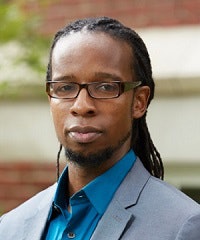WASHINGTON—American University’s annual Summit Institute on Education Equity and Justice drew in dozens of community members—particularly educators—who wanted to share best practices that lead to equitable outcomes for underserved students, families and communities.
Dr. Ibram X. Kendi, an award-winning author, professor and founding director of the Antiracist Research and Policy Center at AU was the keynote speaker at the daylong event held on Saturday.
This year’s theme focused on empowering boys and men of color to become critical scholars and intellectuals.
 Dr. Ibram X. Kendi
Dr. Ibram X. KendiKendi, who authored Stamped From the Beginning: The Definitive History of Racist Ideas in America, which won numerous awards including the National Book Award, said that there is a long history of demonizing young men of color and treating them as troublemakers.
He urged anti-racist educators to focus on the individual and the causes behind rebellious behaviors.
“It is critical for anti-racist educators to not generalize the behavior,” said Kendi. “When we individualize the behavior, we say, ‘okay this is something happening to this individual. He is not a reflection of any other Black boys in the room, in the school, in the community, in the nation. He is a refection of himself.’”
Kendi said some educators perpetuate these racist ideas.
“Really, when you look at racist ideas historically, we see teachers, we see principles whose schools and classrooms have these notorious disciplinary gaps and instead of saying, ‘You know what? It’s something that I’m doing.’ They say, ‘There’s something wrong with these Black boys,’” added Kendi.
He said there is a growing need to teach educators how to teach and added that educators should learn more about the children that they instruct and become knowledgeable about mental health issues.
“One of the things that I think teachers would benefit from is child psychology,” said Kendi. “It is very difficult for children to express complex emotions. Typically, studies show that across racial groups, that the way complex emotions are expressed is through what we can call misbehavior.”
Historically, racist ideas and thinking comes from racist policies, Kendi said, adding that research shows that policies “teach” racism. For Kendi, these policies have prolonged racism through the years.
“The fundamental fight against racism is really against racist policies,” he said, adding that whoever replaces retiring Justice Anthony Kennedy on the U.S. Supreme Court, their judicial votes and decisions will inevitably impact young men of color for decades to come.
In addition to Kendi’s talk, the Summit, which was sponsored by AU’s School of Education, featured workshop sessions on the health, education and law for men of color.
Bomani Johnson, from Emergent Pathways, led a session titled “Growing and Protecting the Genius of Boys and Men of Color.” Kasha Hayes of the D.C. Public Schools discussed the need creating culturally responsive instructional design in the ELA classroom and Dr. Kareem Jordan, from American University, lectured on race, ethnicity and the criminal justice system. Dr. Courtland Lee, a professor in the Counselor Education Program at The Chicago School of Professional Psychology led a lecture titled, “Empowering Young African American Males: A Systemic Development Program for Black Male Elementary, Middle and High School Students” and Anthony Smith, from Cities United discussed roadmaps to safe, healthy and hopeful communities.
Kendi, a longtime contributor to Diverse, offered this sage advice to young men of color struggling in higher education: don’t internalize.
“Reach out,” he said. “There are forces around you that impact the way you behave. Realize that negative behavior does not mean that there is something wrong with you.”


















